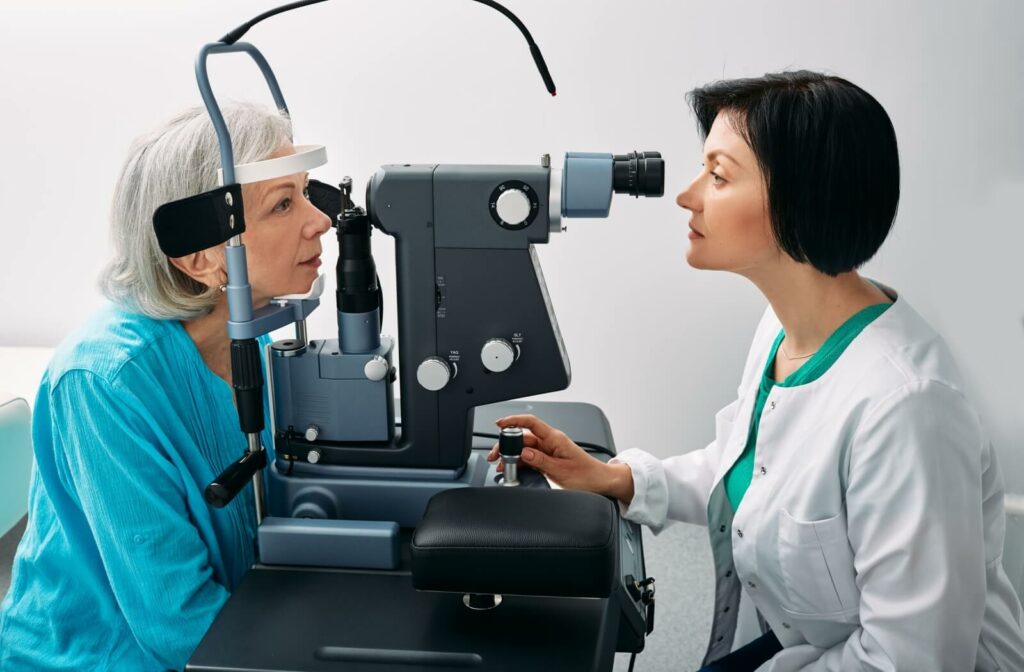There are so many professional roles involved in eye care it can be overwhelming to know who to see when going in for an eye exam. It doesn’t help that all of these professional titles sound so similar. Each profession plays a distinct role in helping individuals with their ocular health.
Their area of expertise depends on their level of education and the area of ocular health they have specialized in. Opticians are responsible for dispensing lenses for vision correction, optometrists are primary eye care doctors, and ophthalmologists are medical doctors who specialize in treating and managing eye diseases.
When in doubt, visit your optometrist. They are the primary care provider for your eyes and can help to treat and manage your vision concerns. They work alongside opticians and ophthalmologists to provide comprehensive vision care for their patients.
Roles in Ocular Care
Each of these professions has its respective role in helping your ocular concerns. The question becomes, what is their role in eye care, what are they specialized in, and when should I visit each eye care professional?
What Is an Optician?
An optician is a trained specialist who fits and dispenses lenses and glasses for an individual’s vision correction. Opticians are skilled in taking eye measurements, suggesting the best eyewear or contact lens for the patient’s needs, and making sure that the chosen product suits the patient’s facial features and anatomical comfort. They help to dispense the tools for vision correction.
Opticians work closely with optometrists to help make sure that an individual’s vision is corrected appropriately with the prescription their eye doctor provides. However, opticians cannot prescribe vision correction or eye medication and cannot diagnose or treat ocular conditions.
To become an optician, one must complete a formal education from a community college or technical training institution, which can take up to 2 years. During their education, opticians study optical theory, eye physiology, lens technology, and ophthalmic dispensing.
What Is an Optometrist?
Optometrists provide primary vision care, which ranges from general eye examinations to the diagnosis and treatment of vision changes in refractive errors, vision therapy, and eye diseases. Seeing an optometrist for routine eye exams is integral to preventive health care.
Optometrists can prescribe eyeglasses or contact lens prescriptions to correct vision and certain therapeutic drugs to help treat eye conditions. They provide comprehensive primary eye care.
A comprehensive routine eye exam often includes:
- Diagnosing visual concerns
- Prescribing vision correction
- Providing vision therapy
- Conducting visual field tests
- Determining the status of a patient’s overall ocular health
Optometrists have earned a Doctor of Optometry. They’ve completed both a bachelor’s degree and 4 years of optometry school. They work alongside ophthalmologists to help manage ocular diseases and treatments and opticians to help with vision correction.
What Is an Ophthalmologist?
Ophthalmologists are medical doctors specializing in the surgical and medical care of the eyes. They are trained to diagnose and treat eye diseases, perform eye surgery, prescribe medication, and prescribe eyeglasses and contact lenses for vision correction.
Ophthalmologists can specialize in a particular area of eye health. They may choose to specialize in retinal, general, or neural ophthalmology. In addition to their extensive training and education in medical school, an ophthalmologist may spend an extra 2 years in their fellowship program while they specialize.
Ophthalmologists work alongside optometrists to help manage and treat certain ocular conditions, such as glaucoma, cataracts, or macular degeneration. An optometrist may refer their patient to an ophthalmologist if the patient’s eye condition and treatment fall outside their scope of care.
When Should You Seek Their Respective Care?
Each of these professions has its respective role in helping your ocular concerns. The question then becomes, when should I visit these professionals?
It’s best to visit an optician once you have an eyeglasses or contact lens prescription you would like to fill. An optician will work with you to find the best lens options that suit your lifestyle needs.
A visit to your optometrist is best if you require primary vision care. This can range from getting your routine eye exam, treating pink eye, dry eye therapy, or removing foreign bodies from the eye. When in doubt, consider contacting your optometrist. Remember, they are the primary care doctor for your eyes!
Your optometrist can work alongside your ophthalmologist by providing post-surgery refractive care or treating and managing ocular conditions like glaucoma. They can refer you to see an ophthalmologist should they feel like you require specialized care.
Visiting an ophthalmologist is best if you are experiencing an ocular emergency that may require surgical or laser care. For example, if you are seeing flashes. If you visit your optometrist first, they may refer you to an ophthalmologist because this will fall out of their scope of care.
If your optometrist identifies a suspected ocular concern (macular degeneration, cataracts, or glaucoma) during your routine eye exam, they will likely refer you to an ophthalmologist for specialized care. Comprehensive exams may uncover underlying health conditions such as diabetes or ocular concerns like glaucoma or cataracts.
For patients between 18 and 64 years old, we recommend visiting your optometrist for a comprehensive eye exam every 2 years. Children under the age of 18 and seniors over the age of 65 are encouraged to see their optometrist annually for routine eye exams.

Consult With Your Eye Doctor
Each eye care professional brings unique skills and expertise to the table. By recognizing each specialist’s role, you can make sure that you receive the comprehensive vision care best suited for your ocular needs.
Your optometrist is your primary eye care provider. At Pinnacle Eyecare, we recommend coming in for your routine eye exams every 1-2 years, depending on your ocular needs. Visiting your optometrist for routine eye exams may help uncover any potential underlying health or ocular concerns. Book a visit with our team today!





